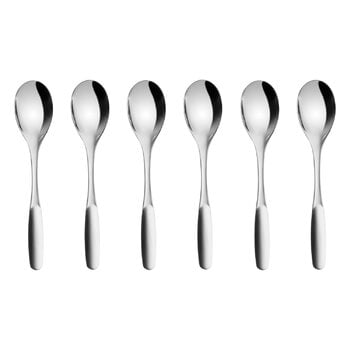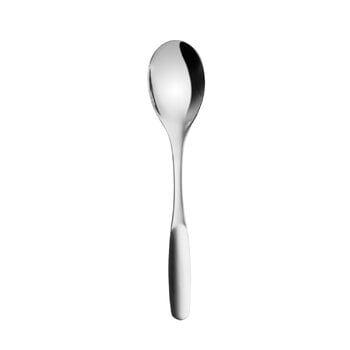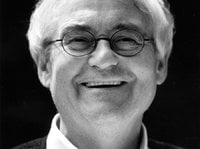Hackman's Savonia cutlery is a true design classic. Designed in 1967 by German designer Adolf Babel, the beautiful flatware looks as modern as ever: Savonia's charm lies in the simple yet functional design that goes well together with any occasion and table setting. It’s not a coincidence it's one of the most popular cutlery ranges in Finland – and the world. The set includes six coffee spoons.
Savonia coffee spoons, 6 pcs
Hackman
Description
Hackman's Savonia cutlery is a true design classic. Designed in 1967 by German designer Adolf Babel, the beautiful flatware looks as modern as ever: Savonia's charm lies in the simple yet functional design that goes well together with any occasion and table setting. It’s not a coincidence it's one of the most popular cutlery ranges in Finland – and the world. The set includes six coffee spoons.
Product details (3)
- Material
- Stainless steel
- Length
- 13.2 cm
- Notes
- Dishwasher proof
- Product ID
Designer
Adolf Babel (b. 1934) is a German designer who has gained international success for his designs. He studied architecture at the University of Stuttgart and design at the University of Berlin. After graduating, he travelled to Finland, fascinated by the culture of rational design and top-notch quality in Finnish manufacturing.
These days Adolf Babel designs everything from cutlery to baths and electrical equipment. Adolf Babel’s cutlery and kitchen utensil designs have received several international design awards. In 1990, Adolf Babel was awarded the most esteemed design prize in Germany, the Longlife Design Award, for the design of his Savonia cutlery range. The Savonia cutlery collection was designed by Adolf Babel for Hackman in 1967 and is the most sold range of cutlery in the world. Savonia combines innovative design with the highest quality and it looks modern still today – a true design classic.
View all productsReviews (4)
4.75
Based on 4 reviews
-
A
Annika R
Uppsala, Sweden
260 days ago
-
M
Maria B
Lund, Sweden
241 days ago
-
S
Silvo S
Hyvä tuote,ollut jo ennestään.
154 days ago
Sustainability
The Product Sustainability Framework, our criteria of sustainable design, helps you find the most sustainable products in our selection. Read below which sustainability criteria this product has met.
Working conditions & labour 8/9
-
Equal opportunities for all employees
-
Commitment to UN Global Compact, fair compensation for all employees
-
Corporate responsibility requirements defined and communicated for suppliers
-
Systematic work for improved inclusion and well-being in the workplace
-
Transparent supply chain
-
Suppliers' compliance to a code of conduct ensured
-
Compliance to the UN Guiding Principles on Business and Human Rights ensured in the supply chain
-
Support for community involvement in the supply chain
-
Direct suppliers audited and certified
Eco-friendly production 7/9
-
Fair and resource-wise water-use in production
-
No incineration or landfilling of returned items
-
No use of endangered species as materials
-
No direct environmental emissions or waste (excl. GHGs) from production
-
The sustainability of direct suppliers' production is addressed and monitored
-
Material-efficient and ecological packaging
-
Positive impact on nature’s well-being through operations that regenerate natural ecosystems
-
Production and material sourcing that respect biodiversity, animal rights, and natural ecosystems
-
No potentially harmful chemicals used in own production
Climate impact 5/8
-
Company's direct greenhouse gas emissions identified and commitment to reduction
-
Product's carbon impact identified and commitment to reduction
-
Guidance on energy- and eco-efficient use of the product
-
Contribution to climate initiatives beyond the brand’s direct operations
-
Low-carbon or compensated transportation
-
Carbon footprint of the product calculated and goals set to reduce it
-
100 % renewable energy in own production and operations
-
Carbon neutral or carbon negative product
Sustainable materials 5/6
-
Sustainable and long-lasting material choices
-
No harmful or hazardous substances
-
Responsible raw material sourcing and production
-
Materials suited for circularity: monomaterials, recyclable finishings, renewable or recycled contents etc.
-
Ecological materials: natural, biodegradable, recyclable or recycled contents
-
Outstanding materials in terms of innovativeness, responsibility, sustainability and circularity: local production or sourcing, 100 % recycled content, C2C-certification etc.
Circular design 4/5
-
High aesthetic quality promoting long-term use of the product
-
Technically durable product design and material choices
-
Design for enduring life-long quality
-
Design and support for product maintenance, repair and upgradability
-
Innovative circular design solutions: circular service system, resale platform, remanufacturing, collection of used products, etc.







